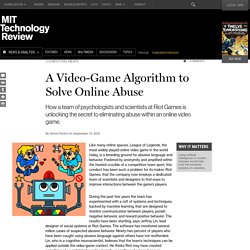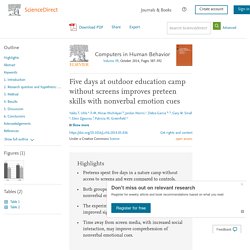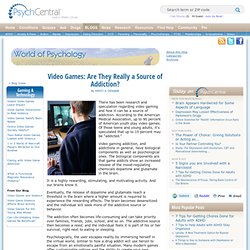

Using Artificial Intelligence to Police the Bullies on League of Legends. Like many online spaces, League of Legends, the most widely played online video game in the world today, is a breeding ground for abusive language and behavior.

Fostered by anonymity and amplified within the heated crucible of a competitive team sport, this conduct has been such a problem for its maker, Riot Games, that the company now employs a dedicated team of scientists and designers to find ways to improve interactions between the game’s players. During the past few years the team has experimented with a raft of systems and techniques, backed by machine learning, that are designed to monitor communication between players, punish negative behavior, and reward positive behavior. The results have been startling, says Jeffrey Lin, lead designer of social systems at Riot Games. The software has monitored several million cases of suspected abusive behavior.
Ninety-two percent of players who have been caught using abusive language against others have not reoffended. Cyberspaced - Psychotherapy DailyPsychotherapy Daily. By Mary Sykes Wylie and Rich Simon Sherry Turkle introduces her 1995 book, Life on the Screen: Identity in the Age of the Internet, with a quote from a poem by Walt Whitman: “There was a child went forth every day, / And the first object he look’d upon, that object he became.”

For Turkle, an ethnographically trained sociologist and psychologist (the founding director of MIT’s Initiative on Technology and Self), Whitman was conveying a profound truth: “We make our objects and our objects make us,” as she’s said. In our high-tech, computer-obsessed age, Turkle’s key mission has become to unravel “how our increasingly intimate relationship with technology . . . changes the way we see ourselves as people. Sherry Turkle: Connected, but alone? Will Brain Wave Technology Eliminate the Need for a Second Language? Earlier this year, the first mind-to-mind communication took place.

Hooked up to brain wave headsets, a researcher in India projected a thought to a colleague in France, and they understood each other. Telepathy went from the pages of science fiction to reality. Using electroencephalography (EEG) sensors that pick up and monitor brain activity, brain wave technology has been advancing quickly in the last few years. A number of companies already sell basic brain wave reading devices, such as the Muse headband. Some companies offer headsets that allow you to play a video game on your iPhone using only thoughts.
Five days at outdoor education camp without screens improves preteen skills with nonverbal emotion cues. 1.

Introduction For several millennia, humans’ primary method for social learning and communication has been face to face. In the 21st century, as mobile technology and the Internet became available to most of the world’s population (Internet world stats, 2013), digital media have become an increasingly prevalent factor in the informal learning environment (Greenfield, 2009).
Humans Need Not Apply. People.stern.nyu.edu/hhershfi/resources/Research/JMR-D-ce.pdf. REVIEW: The changing space of the workplace – virtual worlds, collaboration, and democratic spaces. For millennia architects have been keenly aware of the forces acting on a structure on which they worked – as the physical forces acting on these structures created both centrifugal (outward throwing) and centripetal (inward throwing) forces.

So too, in their work on the construction of physical spaces to structure the way people engaged with one another and the built environment, architects have long focused on the ways in which certain types of space create certain types of movement and interaction. Patients tell more secrets to virtual humans. Patients are more willing to disclose personal information to virtual humans than to actual ones, likely because computers don’t make judgments or look down on people the way another human might.

The findings show promise for people suffering from post-traumatic stress and other mental anguish, says Gale Lucas, a social psychologist at University of Southern California’s Institute for Creative Technologies. In intake interviews, people were more honest about their symptoms, no matter how potentially embarrassing, when they believed that a human observer wasn’t in on the conversation. “In any given topic, there’s a difference between what a person is willing to admit in person versus anonymously,” Lucas says. The study provides the first empirical evidence that virtual humans can increase a patient’s willingness to disclose personal information in a clinical setting. It also presents compelling reasons for doctors to start using virtual humans as medical screeners. Social And Emotional Benefits Of Video Games: Metacognition and Relationships. Social And Emotional Benefits Of Video Games: Metacognition and Relationships.
Virginia Eubanks: Deconstructing the Digital Divide. The future of work is rich in technology and drawbacks. Video Games: Are They Really a Source of Addiction? There has been research and speculation regarding video gaming and how it can be a source of addiction.

According to the American Medical Association, up to 90 percent of American youth play video games. Of those teens and young adults, it’s speculated that up to 15 percent may be “addicted.” Video gaming addiction, and addictions in general, have biological components as well as psychological ones. Does fantasy offer mere escapism, or escape? – Damien Walter. The only people who hate escapism are jailers, said the essayist and Narnia author C S Lewis.

A generation later, the fantasy writer Michael Moorcock revised the quip: jailers love escapism — it’s escape they can’t stand. Does fantasy offer mere escapism, or escape? – Damien Walter. Automation Anxiety. How Virtual Reality Games Can Impact Society, Encourage Prosperity. RAY SUAREZ: Finally tonight: video games, virtual reality and how changes in those technologies may be connected with economic behavior.

NewsHour economics correspondent Paul Solman and Paul’s avatar are our guides, part of his ongoing reporting Making Sense of financial news. And you should know his story contains some video game violence. MAN: You should feel like you’re there. MAN: Oh, gosh. Cerebral circuitry. “social” versus “Social” The semantics of Silicon Valley Capitalism are precise, measured, and designed to undermine preexisting definitions of the things such capitalists seek to exploit.

It is no coincidence that digital connections are often called “friends,” even though the terms “friend” and “Facebook friend” have very different meanings. It’s About Time and Space. When teachers are asked “What is your biggest challenge?” A common response is TIME; Time to learn new strategies, time to plan, time to make improvements, time to have meaningful collaboration with colleagues, time to practice new learning, time to just talk with fellow educators and reflect. SPACE is, in my opinion, another factor. Teachers are in their classrooms most of the day and even when they have a planning time they are generally isolated from other educators in the building whose schedule is likely opposite of theirs.
Common planning is difficult to achieve, particularly because we have not changed the basic infrastructure of how schools are run. xAtlanta - Rhonda Lowry - Literacy in a Networked Society. Why We Need to Teach Mindfulness in a Digital Age. Think of sitting quietly in a spartan room. There are no TVs, computers, smartphones, books, magazines or music. If you’re like most people, this probably sounds like a recipe for boredom. In our culture, we avoid moments of “not-doing” because we don’t associate boredom with having any value. And our aversion to boredom and not-doing have been amplified in our hyper-connected age. Howard Rheingold on how the five web literacies are becoming essential survival skills. Rhonda Lowry - Literacy in a Networked Society. Social Media's Small, Positive Role in Human Relationships - Zeynep Tufekci.
Alone Together. Is Facebook Making Us Lonely? - Stephen Marche. Does the internet rewire your brain? Emotional Impacts of Digital Media - Dr David Gibson. VA's Telemental Health Efficacy Surpasses Face-to-Face Encounters : Clinical Psychiatry News. Location Based Experiences - Value of Augmented Worlds.